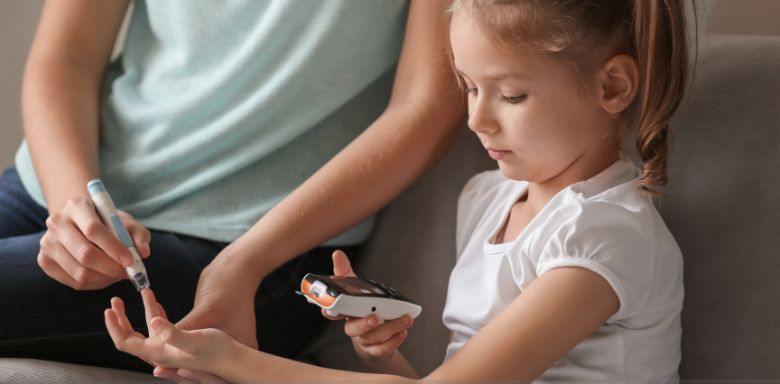Spotlight on Health
You know, diabetes can kick in during childhood and stick around for life. But thanks to all the research, we've gotten way better at understanding it. Plus, now there are tons of support systems and treatments to help manage it.
In 2021, around 352,000 kids and teens under 20 were diagnosed to have diabetes. That's like 0.35% of that age group! This includes 304,000 with type 1 diabetes.
Type 1 diabetes usually shows up first in kids, especially between 6 months and 5 years old, or when they hit puberty. Type 2 diabetes, on the other hand, used to be more of a grown-up thing, but now we're seeing it more in kids too. It's mostly because more kids are carrying extra weight, eating not-so-great and not moving around as much as they should.
Importance of Early Detection of Diabetes in Kids
Spotting diabetes early in kids is super important for a bunch of reasons:
Dodge Diabetic Ketoacidosis (DKA)
Catching it early can steer clear of DKA, which is serious stuff. It's when the body starts breaking down fat too fast, turning it into this acidic fuel called ketones, messing up the blood.
Healthier Outcomes
Nabbing it early and getting treatment means better outcomes. It helps sidestep nasty complications like heart issues, strokes and messed-up kidneys.
Boosted Life Quality
Getting on top of it early means kids can use cool diabetes tech, like continuous glucose monitors. These gadgets mean fewer finger pricks and a better handle on how their blood sugar reacts to everyday life.
Learn and Lean on Support
Catching it early gives families time to learn all about diabetes and how to handle it. They can get help from a diabetes team that knows their stuff about kids.
Open Doors to New Treatments
Catching it early could mean jumping on new treatments to slow down or even stop the disease in its tracks.
So, knowing the early signs, like peeing a lot, always thirsty, losing weight, feeling tired, extra hungry, fuzzy vision and slow-healing boo-boos, is key for getting kids the help they need on time.
Finding Out if Your Kid Has Diabetes
Let's talk about some common physical signs your kid might have. These are the things you might notice happening with their body:
- Always thirsty: Like they can't seem to quench their thirst no matter how much they drink.
- Peeing a lot: They're making way more trips to the bathroom than usual, even waking up at night to go.
- Losing weight: You might notice them shedding pounds even though they're eating normally.
- Blurry vision: Things might seem a bit fuzzy to them, or they're complaining about not seeing clearly.
- Wounds taking forever to heal: Minor cuts and scrapes seem to linger longer than they should.
- Frequent infections: Children with diabetes may have a higher risk of infections.
Children with diabetes may exhibit several behavioral signs. Here are some common ones:
- Changes in eating and sleeping habits: You may notice an increase in appetite or changes in sleep patterns.
- Fatigue: Children with diabetes may feel more tired than usual.
- Irritability and mood changes: Children may display increased irritability, moodiness, restlessness, crying and temper tantrums.
Support and Management
Alright, let's talk about how to handle diabetes once you know your kid has it. Here's what you can do to give them the best support:
First off, it's all hands on deck. The whole family needs to be in the know and ready to pitch in. This means everyone, from siblings to grandparents, understands what's up and how they can help.
Now, onto the nitty-gritty of treatment. For most kids with diabetes, it means insulin. They might need shots or an insulin pump to keep their blood sugar in check. Sometimes, there are oral meds in the mix too, depending on the type of diabetes.
Diabetes isn't just about the physical stuff; it's a mental game too. So, it's crucial to give your kid and your family the emotional support they need. This might mean chatting with a counselor or joining a support group to share experiences and tips.
Managing diabetes often means some lifestyle tweaks. That includes keeping an eye on what they eat, getting regular exercise and making sure they're getting enough rest.
Keep those appointments with the doctor regular. They'll help track how things are going and make any adjustments needed to keep your kid healthy.
Remember, it's a team effort, and with the right support and management, your kid can still live a full and happy life with diabetes.
Article Resources
- Autoantibody test for type 1 diabetes in children: are there reasons to implement a screening program in the general population? | Italian Journal of Pediatrics
- Kids Fare Better With Early Use of Diabetes Technology | Stanford Medicine
- Type 1 Diabetes in Children and Adolescents | Diabetes Canada
- Type 2 Diabetes in Children | Mayo Clinic
- Diabetes in Kids – Signs and Causes | familydoctor.org
